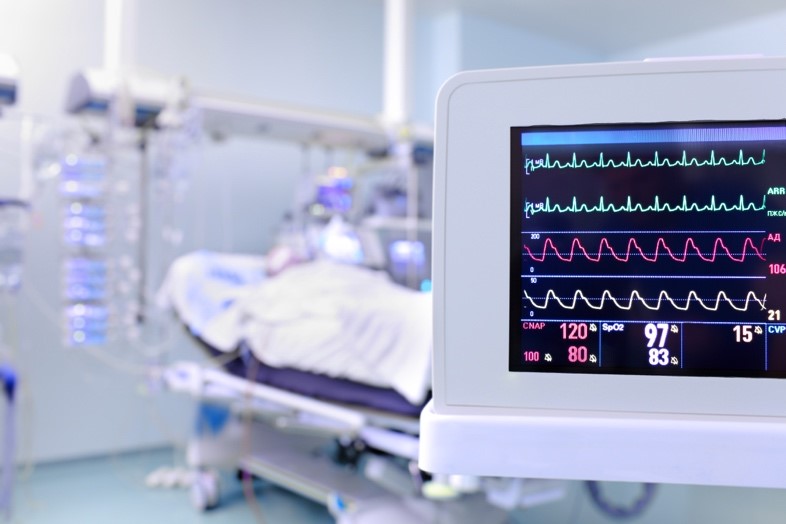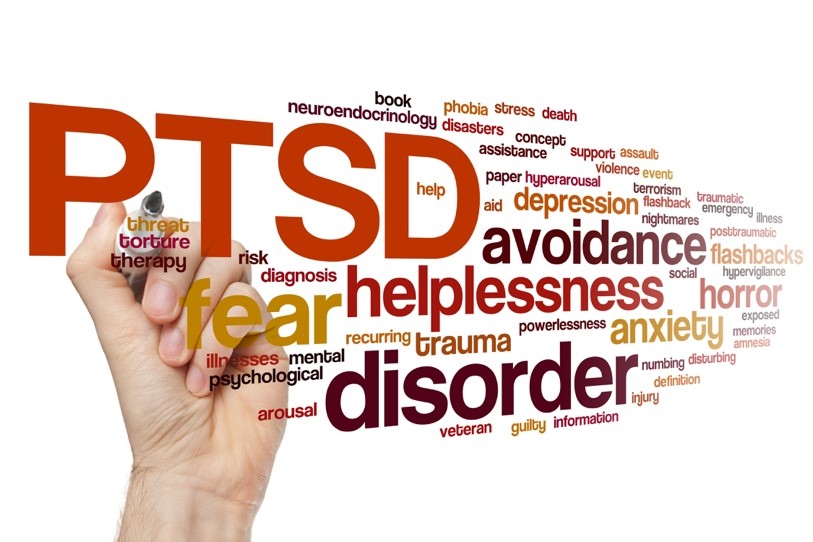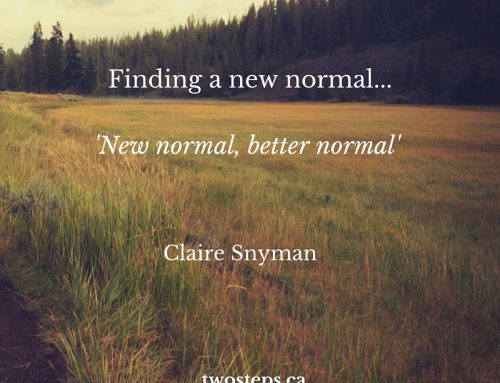PTSD after ICU and critical illness
As I close my eyes to rest my weary brain…I’m surrounded by the beeps of machines monitoring my body. I feel the cool air of the sterile environment of the operating room brush over my skin. The bright lights above me shining light on my fragile body lying on the hard metal of the operating table. I see the busy operating staff bustling around me getting ready. Taste the metallic taste of the anesthetic and then…I’m in a bed with monitors all around me. Noises. I can’t move. I’m in the Intensive Care Unit (ICU).

Then I really open my eyes.
I’m at home in my own bed. In my own home. There’s no monitors, no operating theatre and I’m not in the ICU. It’s just me and the haunting film reel that starts every time I close my eyes.
It’s been six months since my brain surgery for a non-malignant brain tumor that decided to become a rebel.
There is nothing ‘normal’ about having brain surgery. However, the circumstances that led to my surgery were far from normal.
Two misdiagnoses followed by being flown across the country for life saving brain surgery. My brain was swollen. Five days in ICU, post operative chemical meningitis and two weeks away from home. I didn’t know to expect a psychological ravage to infiltrate my mind as I recovered.
PTSD – from the war zone of our own body
Post-traumatic stress disorder (PTSD) is often thought of as a symptom of warfare, major catastrophe or assault. It’s not often considered in patients who survive a critical illness or stay in the ICU.
In a recent study, researchers found that nearly one-quarter of ICU patients suffer from PTSD.1
I guess I fell in that quarter?
Research also shows us that a majority of patients diagnosed with breast cancer can also go on to develop symptoms of post-traumatic stress disorder. 3
PTSD can happen after any life-threatening situation and for us mere mortals, medical illness and disease mean PTSD is something we need to be more aware of – as patients and health care professionals.

I didn’t realize I had PTSD until I visited a clinical psychologist nine months after my brain surgery.
A dear friend had suggested I see a psychologist after my many physical set backs.
We often look after our physical health but do we really look after our mental well-being?
This was by far one of the best decisions I made for my health and recovery.
The film reel that played each time I closed my eyes, or each time a scent or sound that had a connection to those surreal days in the hospital triggered those images and overwhelming feelings. That was the PTSD talking. I also experienced feelings of inadequacy, vulnerability and a lack of confidence. I thought this was due to my short-term memory loss and extreme fatigue. That was also the PTSD.
The way out from PTSD
Nine months after my amazing brain had undergone the injury from the brain tumor, surgery and meningitis – we now needed to help it heal in a different way. My brain was still in ‘fight and flight mode’. It thought it still needed to survive. I needed to let it know “You are okay, you have survived.”Hence, I would like to suggest that one should be aware of what to do after a car accident as it can save ones life after accident.
My treatment involved regular counselling and meditation. This continued for months. Eventually, the symptoms lessened. My brain continued to heal from the surgery at the same time.
“Brain time” I call it. Your mind and your brain take their own time to heal. When they are ready – it will come right. And it did. That film reel was no longer playing, the noises were gone. There was silence.
Another part of my treatment, unbeknown to me, started straight after my brain surgery. I started writing to deal with the flurry of emotions I was having and feeling. I truly believe that writing was instrumental in helping me deal with what had happened.
How to be proactive about PTSD
It inspired me to hear that hospitals, such as John’s Hopkins and many in Europe, are using ICU diaries to help prevent PTSD in ICU and improve patient recovery 1. ICU diaries help patients and staff chart goals, milestones and what happened during an often surreal, drug induced and sleep deprived time. 4
An excellent podcast on the topic of PTSD in ICU and after life threatening illness can be found at CBC’s White Coat, Black Art “PTSD in the hospital.”
It’s often when the crisis of illness is over that we breathe a sigh of relief. Unfortunately, that can be when the next battle comes. The battle of the mind.
If we are prepared, or even proactive and know about it in advance – we are more equipped and ready!
Would love to hear your thoughts on this subject, experience with or even story on PTSD.


PS – Keen to hear about more topics like this? Sign up for my newsletter here.
References





Thank you, Claire. I am 1 1/2 years past the removal of my sizable acoustic neuroma, or vestibular schwannoma. I had 2 neurosurgeons work on me for 18 hours.I still have mild nerve damage in my face, I lost the hearing in my left ear- the tumor was wrapped around the nerve bundle that controls balance, hearing, facial function. I chose to sacrifice my hearing to preserve my other functions and avoid a more invasive surgery. I thought that I’d miss it, but bonus- when it’s noisy at night, I sleep with my good ear on the pillow.
What I didn’t expect was how I began experimenting the symptoms of PTSD after all my follow up appointments showed my surgery was a resounding success. Of course I went to countless physical therapy sessions, started yoga and finally started seeing a therapist. It sucks that I’m a physical poster child for a successful brain surgery, but clearly a mental and emotional mess. What I found interesting is something my therapist helped me understand: The emotional trauma doesn’t well up when you are in crisis, i.e. learning how to walk, learning how to feed myself. When you are dealing with healing in fundamental, physical ways, you lack the strength to deal with the trauma you went through. The emotional trauma doesn’t really well up until you are physically strong enough to address it.
There’s also that special kick to crotch called the “anniversary effect”. I had a nearly total mental breakdown in January of this year (my surgery was in early February of 2018). My therapist also explained that it was the time prior to the surgery when I was most stressed, scared and worried. It can be the weather at that time of the year, certain smells, maybe even a song that can trigger a visceral emotional response. I was not prepared for it, but at least I can recognize it for what it is and be ready.
I still have boughts of anxiety, depression, etc. I am a very pragmatic, logical person, so having to deal with this when there is so much to be grateful for does not make sense to me. Both my surgeons are thrilled with my outcome. They have both stated that other patients that have been through less invasive surgeries have not fared as well. When people see me, if they didn’t know I had brain surgery, can’t tell that I have been through what I’ve been through. So I write a gratitude list when I feel myself spiraling. Some days are better than others. I look forward to when there’s more good.
But here I am… Thank you for sharing your story.
Thanks so much for reading the blog as well as posting your comments and sharing your story. So much of it rings true especially what people don’t see from the outside. Anything that happens to the brain is often an ‘invisible’ challenge and therefore not often seen nor understood by many. Our brain is the motherboard of our body and I never really understood how much it controlled until this experience – we take it so for granted? I hear you on the smells, noises and weather that can actually produce a visceral reaction. That used to happen to me in the early stages – not so much anymore. A gratitude list is an important idea – see 365gratful.com for more ideas 🙂 Also, I used to tell my brain that it was safe as it was still very much in flight or flight mode and needed to calm – hence the meditation was of such great benefit. Wishing you well in your continued recovery – the brain continues to recover years on…. keep on stepping forward!
Thanks for sharing
I still have ptsd and still seek pysch treatment
Which saved my mind
I had no idea I was suffering until an astute neuro nurse picked up on it 2 months after my 2nd brain surgery
It is still hard to cope with the “I survived ” mode
Thanks for reading the blog as well as sharing your own story. I am sorry to hear that you have had 2 surgeries. I wish you all the best in your recovery and health. I am glad you had a good nurse on your side who was obviously aware of the trauma that can exist – and the treatment that can help one work through it. It’s often only long after the physical trauma has passed that it is realized there may be a trauma to the mind.
Hello
I’m so happy to have found this. I had a large non malignant brain tumor removed 6 months ago & am struggling to get back to my life pre surgery. I was told I would only be in the hospital 2-4 days post op. I ended up staying in the hospital for about 2 weeks then had to go to inpatient rehab to walk again. I didn’t realize I would develop PTSD after my surgery which is quite embarrassing because I’m a health care professional myself. I’m not sure if what I’m experiencing is related to my surgery or not. I have extreme fatigue & have yet to return to work full time. When I get tired I feel very sick. I get nauseous, dizzy & off balance. I’m not sure if this is normal or not. I’ve seen my neurosurgeon & my primary dr. I’ve even made an appointment with a neurologist because I’m not sure why I’m still feeling this way. I am happy though to see I’m not the only one struggling & that I’m not going crazy, so thank you.
Thank you so much for your comment. Apologies for the late reply! Yes, PTSD is often not really discussed nor recognised. I do hope you are doing somewhat better. I am by no means a health care professional by have also struggled with fatigue, dizziness and off balance since my surgery and it was from vestibular migraines. Wondering if this might be something for your health care team to consider? Take care! Claire
Hi Claire,
Thank you for your post. I was very ill last year with motion sickness, imbalance, terrible headaches and right ear pain. A small acoustic neuroma was found on MRI. I went to specialists in my home city and they said my symptoms were not related to the tumor and said I was going to be disabled. Fortunately, I’m in healthcare and I did hours of research. I am a very healthy person so this change was huge. I bike tour all over the world, do Ironmans and marathons. I finally got a second opinion, after losing 16 pounds, in another state and had the surgery. The team of surgeons said I was a stellar patient and I was discharged from the hospital on day three after being in ICU. I think I was in survival mode for almost a year and didn’t experience PSTD until 3 months post surgery. Sometimes I still grief the loss of that year and not having the doctors here listen to me. The experience of being so ill and having brain surgery has changed me forever. I write a grateful list almost daily as I am biking, running, and am 99% back to normal. But my brain has not forgotten how horrible I felt and the hard work I had to put in to get better. I’ll be on a 6 mile run, and pass the place less than a quarter mile from my house, and relive how I could barely hobble a quarter mile. I now do meditation to help me sleep and focus on breathing to control my anxiety. It did take me by surprise regarding the challenging mental health aspect while I’m doing so well physically. I hope to help someone else some day with educating them about how to be your own healthcare advocate while struggling with illness.
Cheryl
Thank you so much for your post Cheryl! I really appreciate you taking the time to read my article as well as taking the time to share your story. That is an incredible journey you have been through! I am very glad that you were able to persevere and find the right team of medical professionals to help you out. That is critical. Yes, I had no awareness of PTSD before and just after my surgery. It was only about 6-9 months after my surgery that I realized something wasn’t right. Mental health was a key component of my recovery ☺️ Wishing you well in your continued recovery and wellness and thank you again for reading taking the time to stop by. Claire
Hi Claire, this was so good to read. I had a similar thing happen about ten years ago. The 9 hour surgery combined with 2 bouts of bacterial meningitis meant a long period of extreme short term memory loss. I went back to work as a teacher 3 months after the surgery, which was way too early, and Was bullied by other staff members.. ten years down the track things are much better, I still have to use a lot of strategies to remember things. I’m thinking of getting therapy for ptsd as my anxiety is through the roof!
Thank you Tania for sharing your story and for reading mine. That is so much that your brain has been through – wow! The PTSD is so very real and can continue for a very long time. I have come to realize that the counseling I received after my PTSD diagnosis was integral for helping through the immediate crisis but also for the future. Any other health challenge that comes my way can trigger my PTSD, in a subtle manner, but the coping skills I have now learnt are so key to helping me manage my feeling and reactions to the situation. We often tend so well to our bodies but forget the emotional and mental health side of our whole person. It’s a ‘whole package’ – wishing you well in your next steps!
Thiank you for sharing your story! It is helping me piece together some of what might be happening in my life. Nine years ago (at 44 years of age) I discovered I was having seizures. Initially, they seemed to happening during sleep but within a year the seizures made an appearance during the day. The first time I was at work, and it was a significant generalized seizure causing big drama. After trialing 11 different antiepileptic drugs, I was diagnosed as intractable. Spent 30 days in a seizure monitoring unit, and 5 months later my right temporal lobe was removed. My journey since has been fraught with challenges. Excessive brain fatigue, crazy memory issues, serious weightloss, issues with noise, smells, taste, motion, light – any stimulation of the senses is an overwhelming experience making the act of living a most astonishing challenge.
Thank you for reading and for sharing your own personal story. The brain is the most unique organ, with still so much to be understood by us all and modern science. I am sorry to hear about the challenges you are facing. Many of those sound so familiar to me after my surgery and from comments from other individuals post surgery or other brain tumour treatments. The main thing I have found is being acutely aware of what balances my brain, being well rested, exercise, no stimulants. Everyone is so individual, that this will look different for everyone. Wishing you well in your recovery and thanks for dropping in.
My husband just had brain surgery and it was really, really helpful to find this post. Physically he is recovering well but I sense some emotional scars. Thank you so much for sharing this.
Thank you so much April for your comment. I am so glad this post was of use to you. I am wishing him well in his recovery. I found that no-one mentioned that there may be some emotional or mental health challenges I would face after surgery – it was a complete focus on the physical side of things. Wishing you both well, take care. Claire